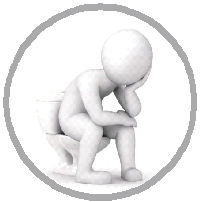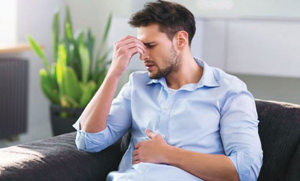Irritable Bowel Syndrome


Irritable bowel syndrom is a common functional gut disorder and is a common disorder that affects the large intestine (colon). Functional means that the function is upset but there is no abnormality in the structure of the bowel even when looked at under the microscope. There is no cure for IBS but symptoms can be eased and managed. It commonly affects young females compared to males.
Causes:
It’s not known exactly what causes irritable bowel syndrome, but a variety of factors play a role:
- overactivity of the nerves in the gut like in stress.
- Intolerence to certain food.
- Changes to the friendly bacteria in the gut following gut infection.
- Oversensetivity to pain.
Symptoms:
Most people have IBS symptoms that comes and goes. Triggers are things like specific food, stress, dehydration etc.
Its symptoms may include:
- Change in bowel habits like diarrhea, constipation, mucous mixed with stool, urgency to open bowel, sensation of incomplete emptying of the bowel and pain in the back passage ( tenesmus).
- Bloating and swelling of the abdomen. Patient may pass more gasses.
- Abdominal cramps that is relieved by passing stool or passing wind.
- Sometimes irritable bladder like urgency, heartburn, muscle pain, backache, tierdness, belching,headache, mood changes.
- You should tell your doctor if passed blood in stool or been losing weight without intention.
Even though signs and symptoms are uncomfortable, IBS unlike ulcerative colitis and Crohn’s disease, which are forms of inflammatory bowel disease doesn’t cause changes in bowel tissue or increase your risk of colorectal cancer.
Only a small number of people with irritable bowel syndrome have severe signs and symptoms. Some people can control their symptoms by managing diet, lifestyle and stress. Others will need medication and counseling.

When to see a doctor?
It is important to see your doctor if you have a persistent change in bowel habits or if you have any other signs or symptoms of IBS because these may indicate a more serious condition.
Symptoms that may indicate a more serious condition include:
- Rectal bleeding
- Abdominal pain that progresses or occurs at night
- Weight loss

Management of IBS:
It is important to address what triggers your symptoms for example if it is stress then try to manage stress levels. It is useful to keep a symptoms diary including triggers and this can be reviewed along with your doctor. There are mobile phone applications to help you record your symptoms, for example ( IBS Tracker app). We encourage you to improve your exercise levels.
General advice is to eat healthy, exercise like swimming, drink at least 2 L of fluids a day and try to relax and avoid stress. Also try to eat regular meals, chew your food properly and do not eat late at night.

In addition to the above you should try to :
- Reduce caffiene intake by drinking no more than 2 cupsa day. Avoid filtered coffee and replace with tea or instant coffee sachets.
- Reduce fizzy drinks including diet ones.
- Reduce resistant starches like: crisp , pizza, ready meals, sweetcorn, bran, dried pasta, food that have been cooked and cooled like cold salad.
- Change type of fiber intake as if it is insoluble it will worsen diarrhea symptoms , for example wheat and bran, corn, nuts, skin and core of fruits as example of insoluble fibers.
- Drink 8-10 cups of water daily.
- Reduce fatty food and replace margarine with oil, boil or steam food etc.
- Reduce fructose as it may worsen diarrhea so limit it to 3 smalll portions of fruit daily.
- Avoid Sorbitol in artificial sweetners, slimming products etc.
- Try probiotic yogurt drinks like Activia etc.

For some patients, the diet modifications is not enough to help their symptoms. In this case you need to speak to your doctor who can prescribe some medications and refer you to a specialist dietician. Medications usually prescribed are to treat constipation and to help with diarrhea. Peppermint oil tablets are prescribed to help with bloating and heart burn.
References:
Adapted from www.patient.co.uk
- Irritable bowel syndrome in adults: diagnosis & management of irritable bowel syndrome in primary care; NICE Clinical Guidelines. (February 2015)
- Moayyedi P et al; the efficacy of probiotics in the treatment of irritable bowel syndrome: Gut. 2010 Mar; 59(3):325-32. Epub 2008 Dec 17.
- Halmos EP et al. A diet low in FODMAPs reduces symptoms of IBS. Gastroenterology.2013 Sep 24. pii:S0016-5085 (13)01407-8



